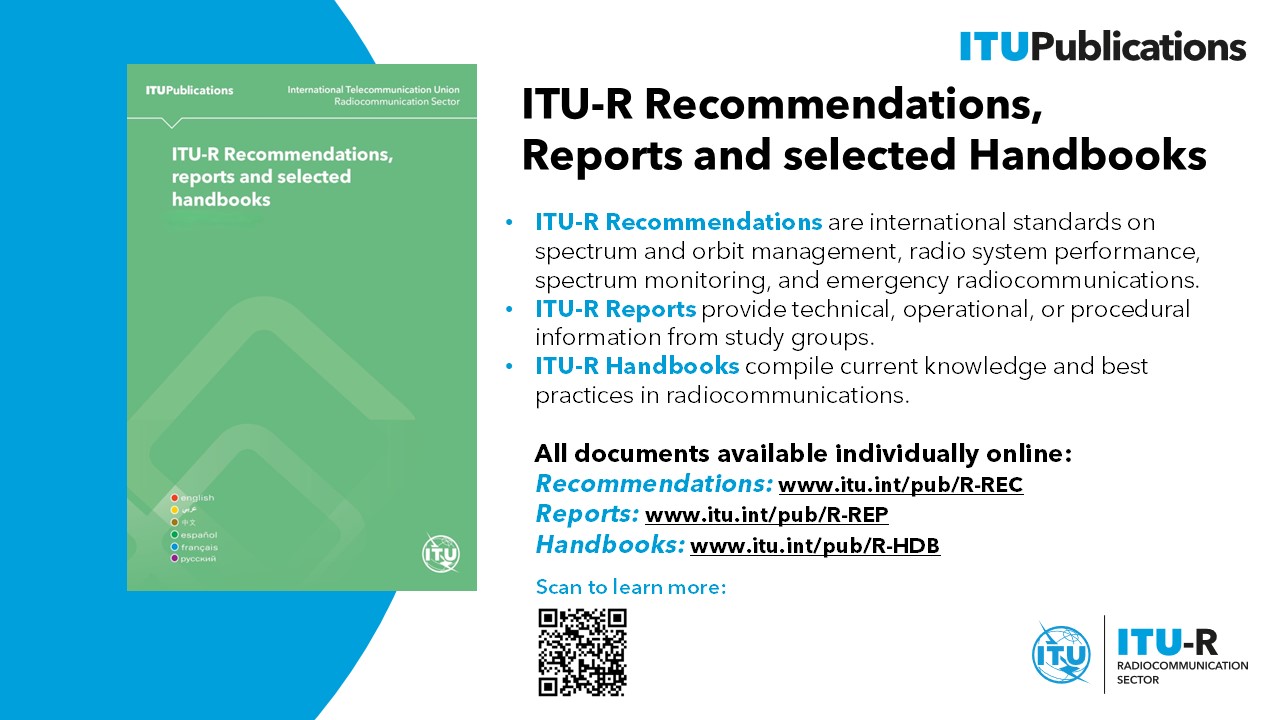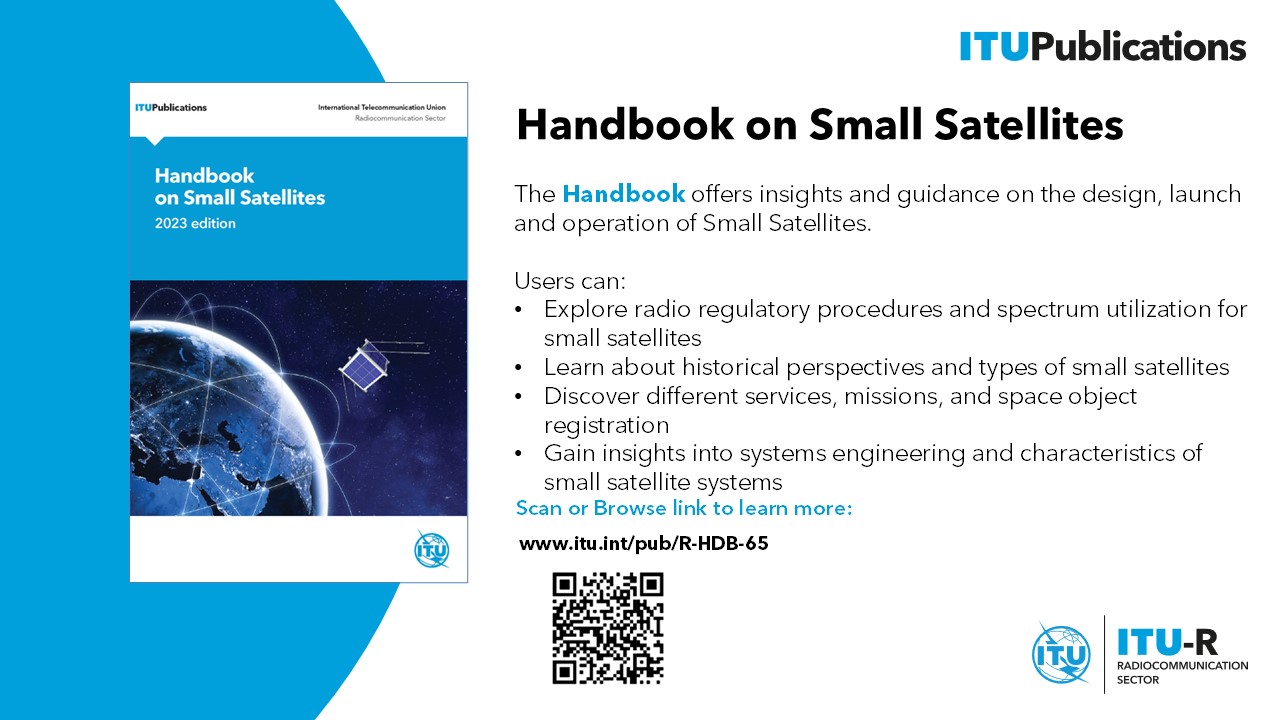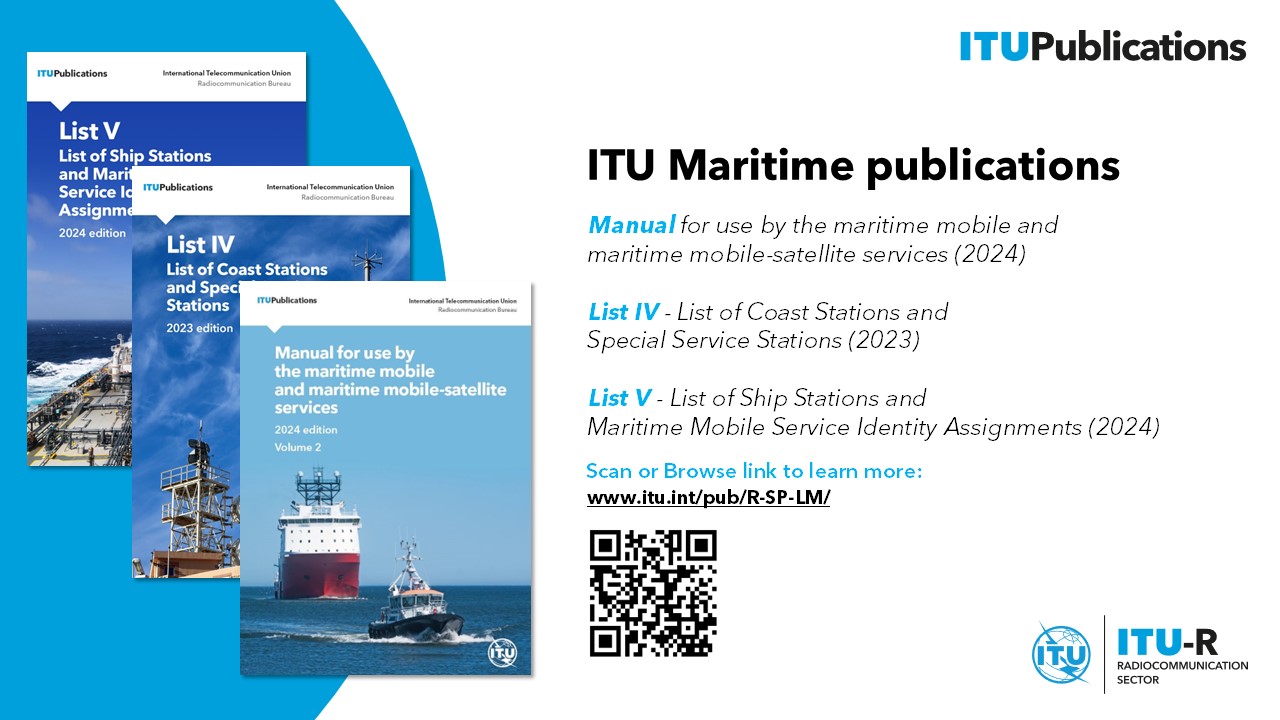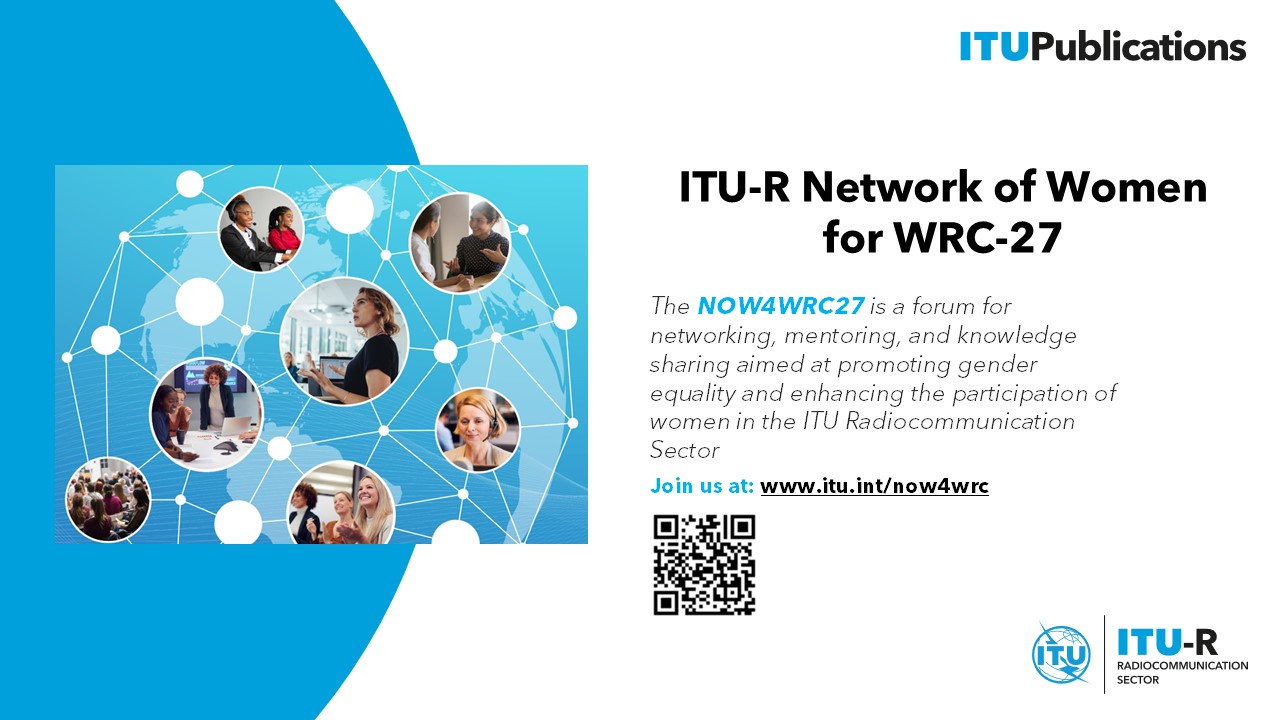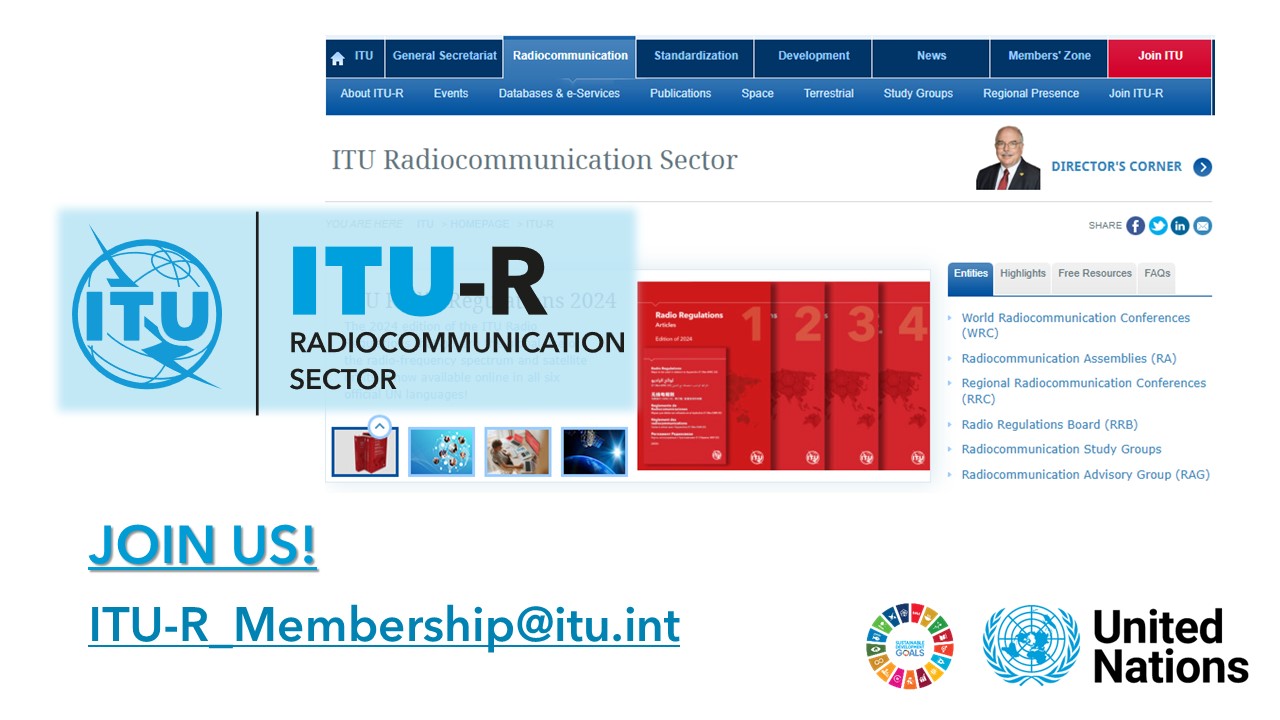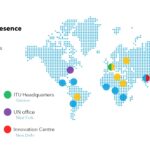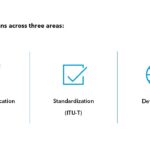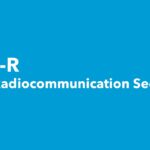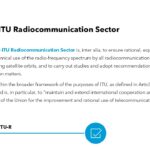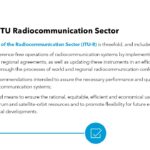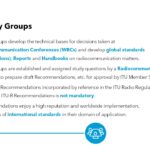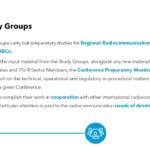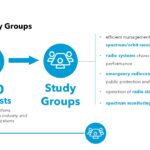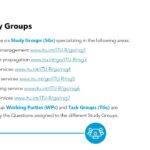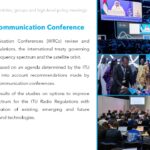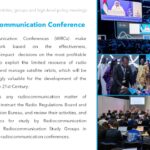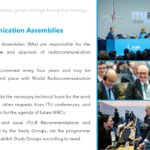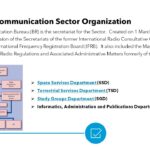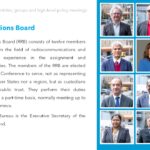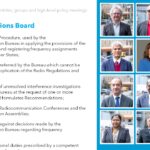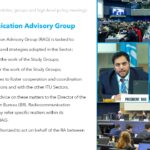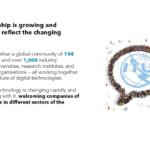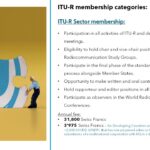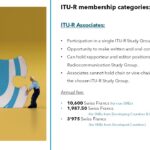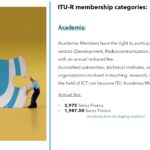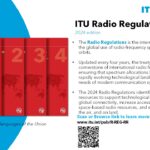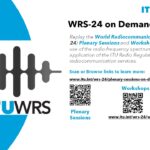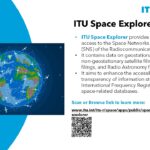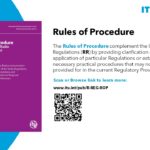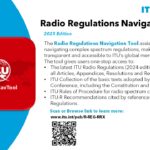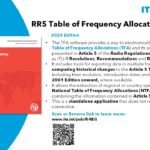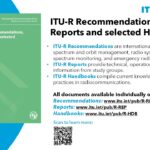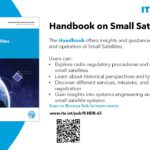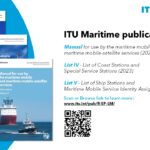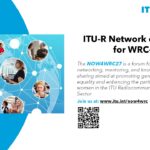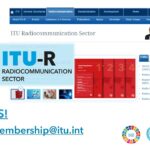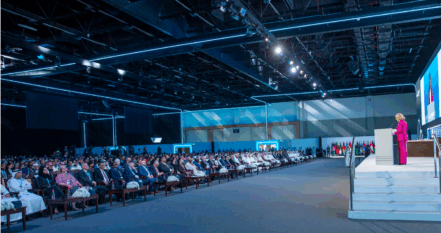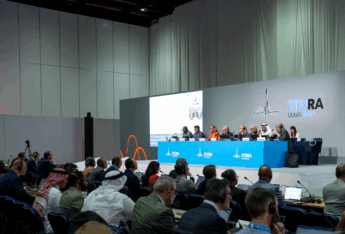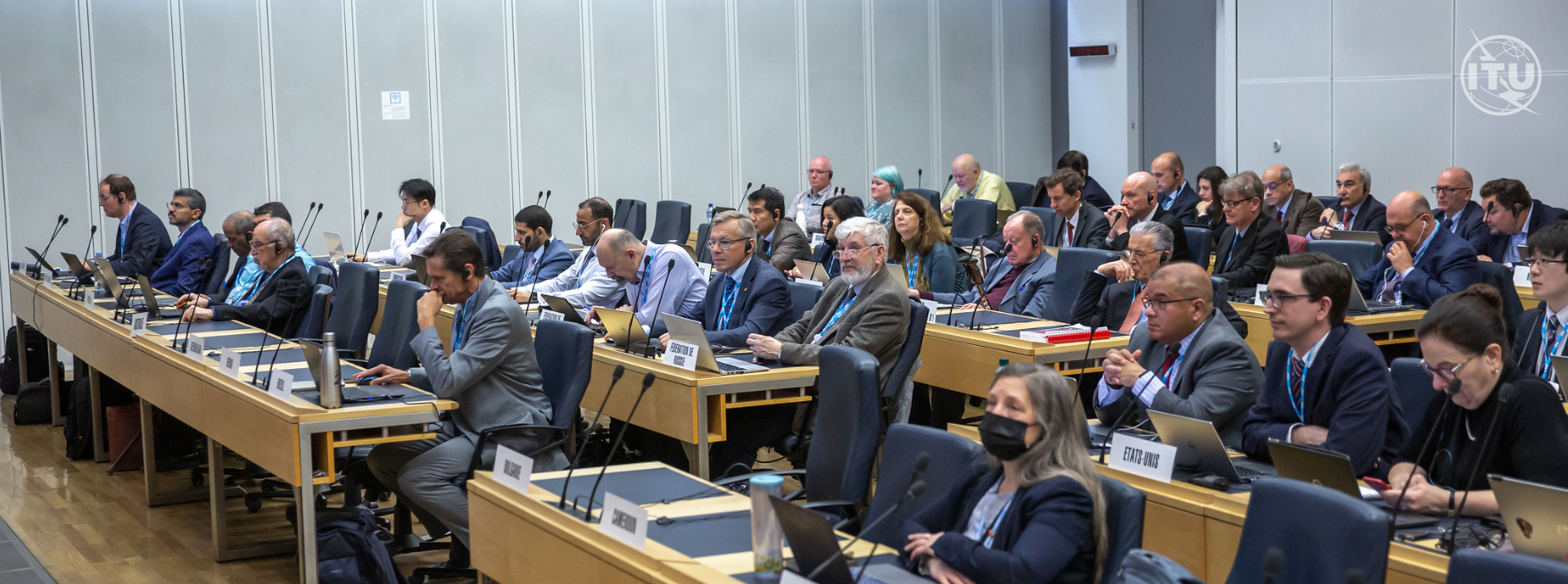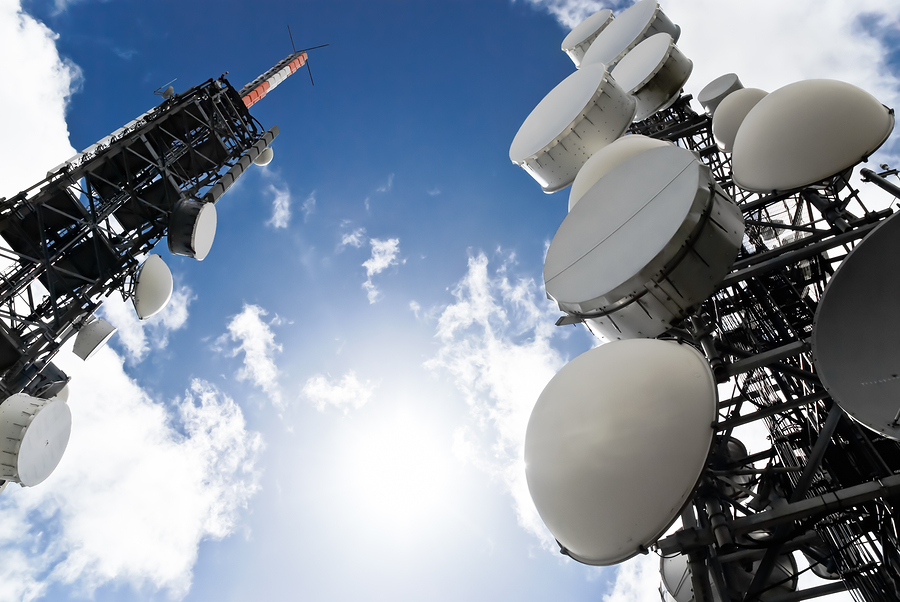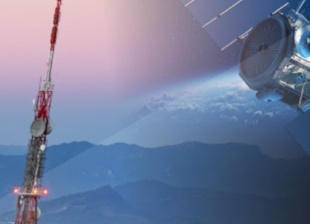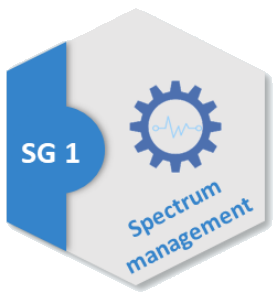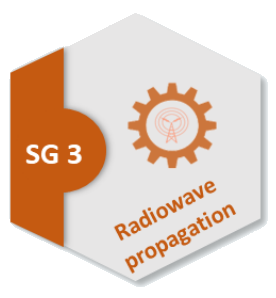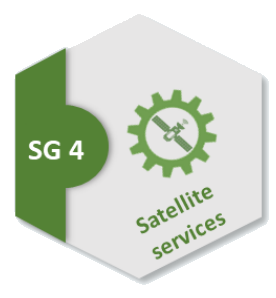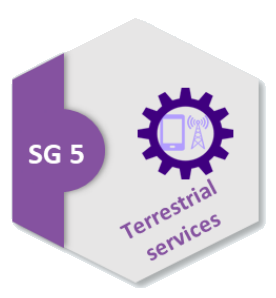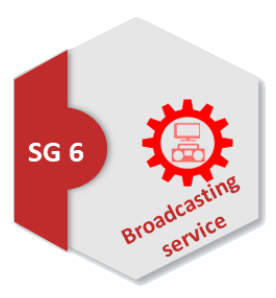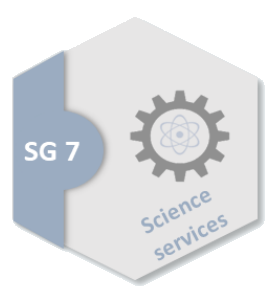ITU-R Membership
Industry and academic entities can actively engage in and contribute to the work of ITU-R. With targeted membership categories designed for different types of institutions, ITU-R enables effective collaboration and maximizes the impact of joint efforts in advancing radiocommunication.
The ITU Radiocommunication Sector is a unique global platform uniting administrations, industry, academia, and stakeholders to shape the future of radiocommunications. Your engagement is key to ensuring the efficient, fair, and interference-free use of the radio-frequency spectrum and satellite orbits. Together, we drive innovation, strengthen international cooperation, and support essential services — from broadcasting and mobile networks to satellite, aeronautical, maritime, and emergency communications.
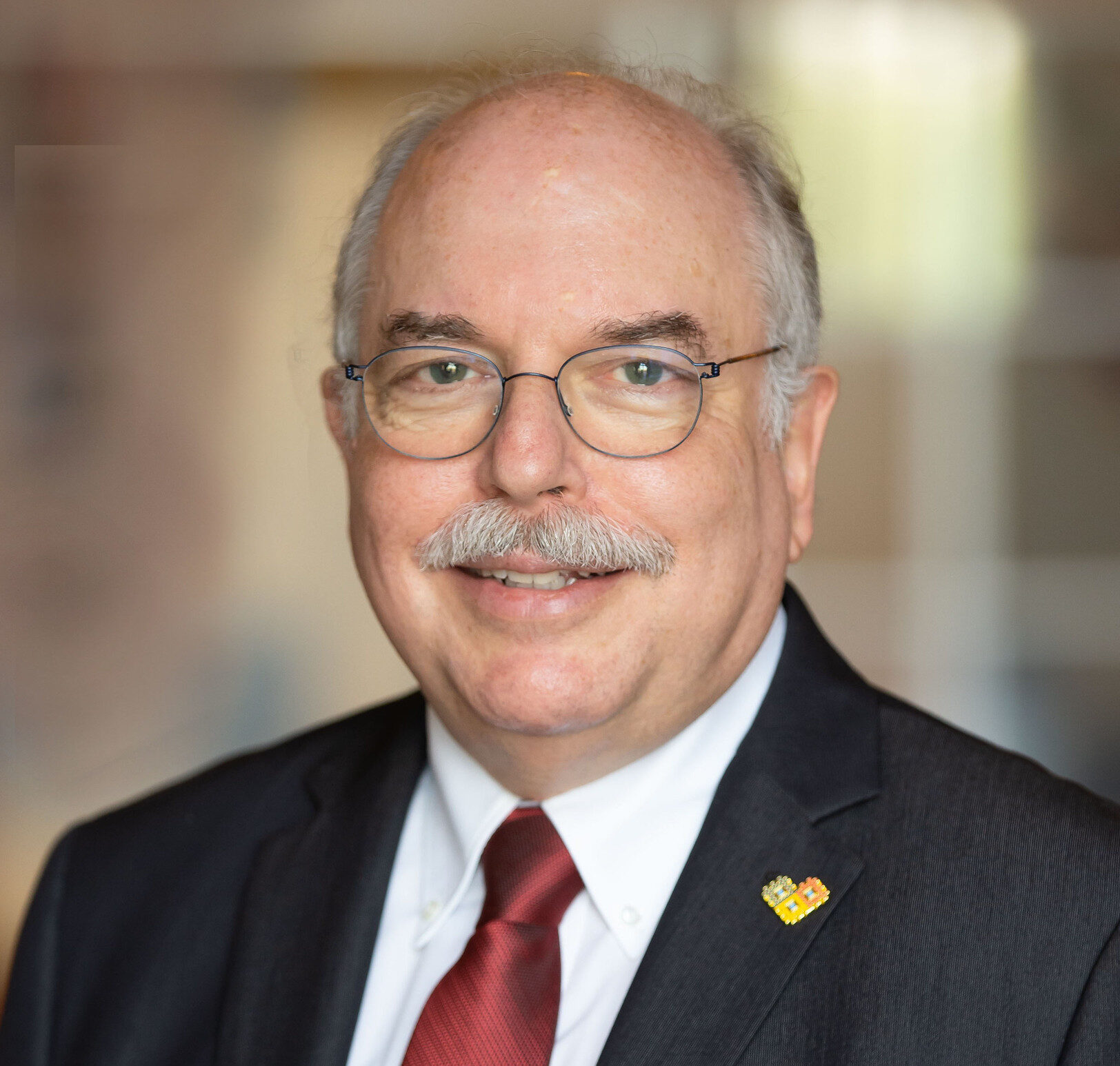
Not a member yet?
Why Join the
ITU Radiocommunication Sector (ITU-R)?
Becoming a member of the International Telecommunication Union Radiocommunication Sector (ITU-R) offers a range of strategic, technical, and regulatory benefits …

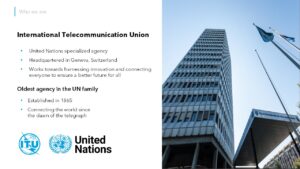
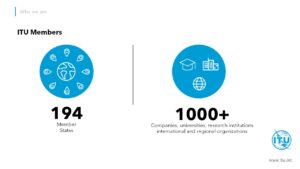
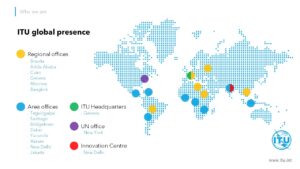
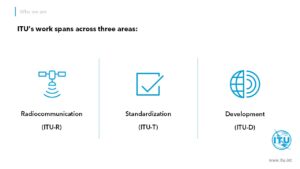
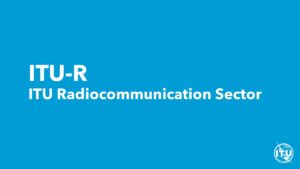
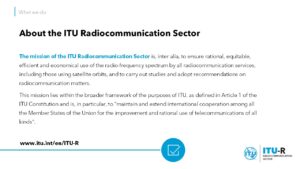
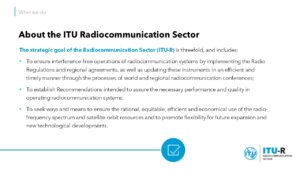
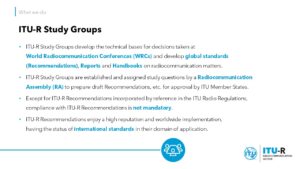
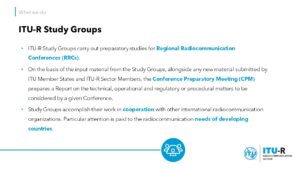
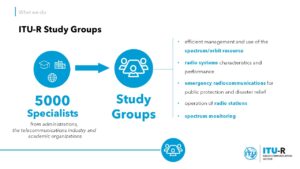
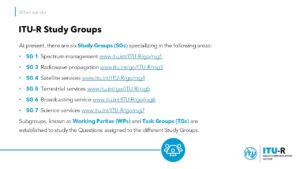
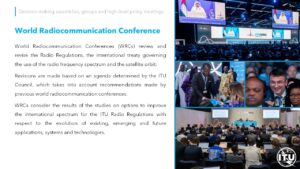
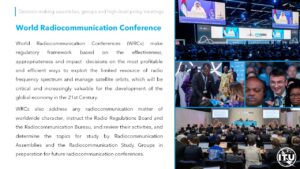
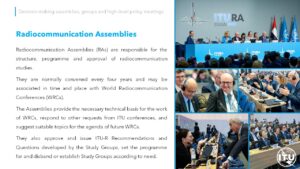
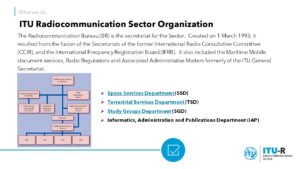
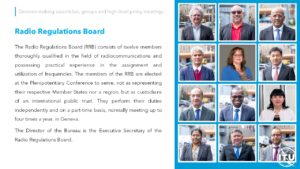
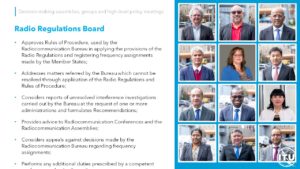
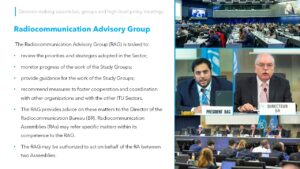
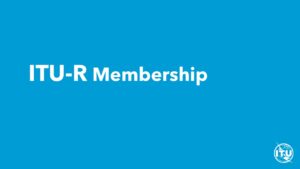
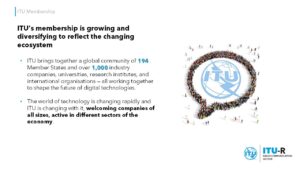
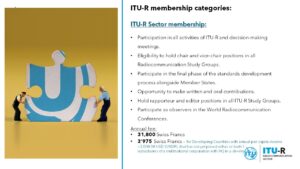
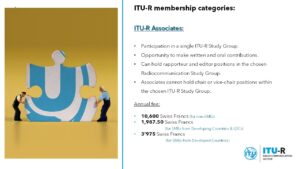
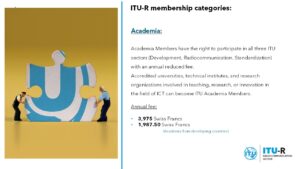
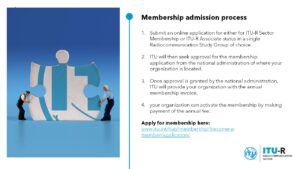
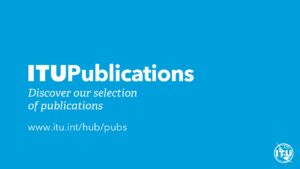
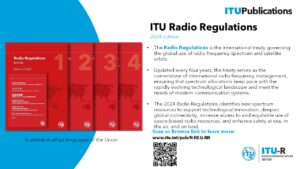
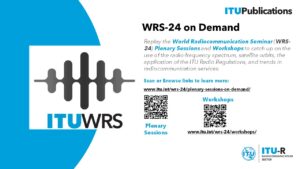
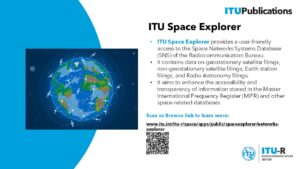
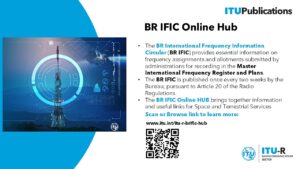
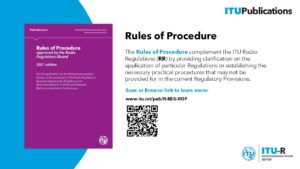
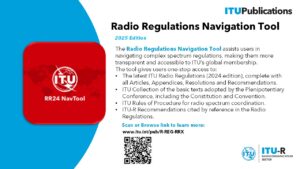
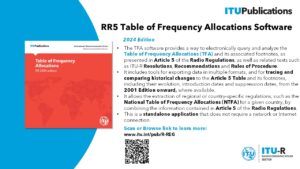
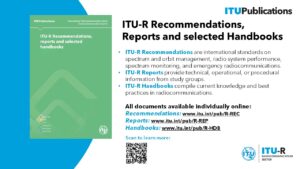
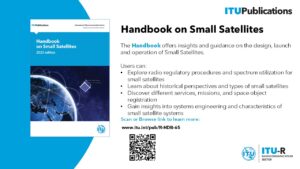
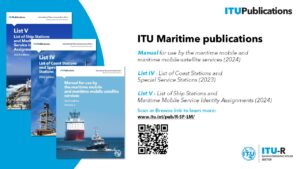
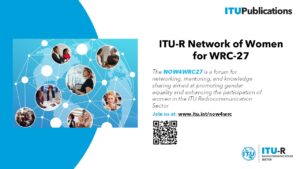
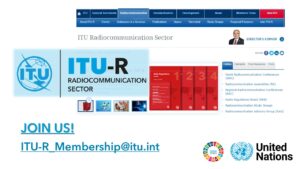
ITU User Account & TIES Services
ITU has a new User Account platform. This means that the web interface for user account creation and management has changed. Other services remain the same.
The new platform improves the user experience and brings enhancements for the TIES Focal Points to manage Users and TIES access rights within their organizations/entities.
ITU User Accounts are free of charge and allow you to register for ITU events, subscribe to ITU mailing lists, access the ITU Bookshop, and use certain applications of ITU sectors.
TIES (Telecommunication Information Exchange Service) is a set of networked information resources and services offered by ITU without any charge to ITU Members (Member States, Sector Members, Associates, Academia, and UN System) to support their participation in the activities of the Union.
An ITU user account is required to request TIES access that must subsequently be approved by the corresponding TIES Focal Point.
Missed the Webinar introducing the new system and features for Focal Points? You can view the presentation and the recorded webinar (TIES protected).
ITU-R Activities
World Radiocommunication Conferences (WRC)
World Radiocommunication Conferences (WRC) are held every three to four years to review, and, if necessary, revise the Radio Regulations, the international treaty governing the use of the radio-frequency spectrum and the geostationary-satellite and non-geostationary-satellite orbits. Revisions are made on the basis of an agenda determined by the ITU Council, which takes into account recommendations made by previous world radiocommunication conferences. The general scope of the agenda of world radiocommunication conferences is established four to six years in advance, with the final agenda set by the ITU Council two years before the conference, with the concurrence of a majority of Member States. Under the terms of the ITU Constitution, a WRC can:
- revise the Radio Regulations and any associated Frequency assignment and allotment Plans;
- address any radiocommunication matter of worldwide character;
- instruct the Radio Regulations Board and the Radiocommunication Bureau, and review their activities;
- determine Questions for study by the Radiocommunication Assembly and its Study Groups in preparation for future Radiocommunication Conferences.
On the basis of contributions from administrations, the Radiocommunication Study Groups, and other sources (see Article 19 of the Convention (Geneva, 1992)) concerning the regulatory, technical, operational and procedural matters to be considered by World and Regional Radiocommunication Conferences, the Conference Preparatory Meeting (CPM) shall prepare a consolidated report to be used in support of the work of such conferences.
Previous conferences
- World Radiocommunication
Conference 2023 (WRC-23)
20 November – 15 December 2023
Dubai, United Arab Emirates - World Radiocommunication
Conference 2019 (WRC-19)
28 October – 22 November 2019
Sharm El-Sheikh, Egypt - World Radiocommunication
Conference 2015 (WRC-15)
2-27 November 2015
Geneva, Switzerland - World Radiocommunication
Conference 2012 (WRC-12)
23 January – 17 February 2012
Geneva, Switzerland - World Radiocommunication
Conference 2007 (WRC-07)
22 October – 16 November 2007
Geneva, Switzerland - World Radiocommunication
Conference 2003 (WRC-03)
9 June – 4 July 2003
Geneva, Switzerland - World Radiocommunication
Conference 2000 (WRC-2000)
8 May – 2 June 2000
Istanbul, Turkey - World Radiocommunication
Conference 1997 (WRC-97)
27 October – 21 November 1997
Geneva, Switzerland - World Radiocommunication
Conference 1995 (WRC-95)
23 October – 17 November 1995
Geneva, Switzerland - World Radiocommunication
Conference (Geneva, 1993)
15 – 19 November 1995
Geneva, Switzerland
Radiocommunication Assemblies (RA)
Radiocommunication Assemblies (RA) are responsible for the structure, programme and approval of radiocommunication studies.
They are normally convened every three or four years and may be associated in time and place with World Radiocommunication Conferences (WRCs).
The Assemblies:
- assign conference preparatory work and other questions to the Study Groups;
- respond to other requests from ITU conferences;
- suggest suitable topics for the agenda of future WRCs;
- approve and issue ITU-R Recommendations and ITU-R Questions developed by the Study Groups;
- set the programme for Study Groups, and disband or establish Study Groups according to need.
Previous Assemblies
- Radiocommunication Assembly 2023 (RA-23)
SHARM EL-SHEIKH, EGYPT - Radiocommunication Assembly 2019 (RA-19)
SHARM EL-SHEIKH, EGYPT - Radiocommunication Assembly 2015 (RA-15)
GENEVA, SWITZERLAND - Radiocommunication Assembly 2012 (RA-12)
GENEVA, SWITZERLAND
Radiocommunication Advisory Group (RAG)
According to the ITU Constitution (CS 84A) and Convention (CV 160A-160H), the Radiocommunication Advisory Group (RAG) is tasked to:
- review the priorities and strategies adopted in the Sector;
- provide guidance for the work of the Study Groups
- recommend measures to foster cooperation and coordination with other organizations and with the other ITU Sectors.
The RAG provides advice on these matters to the Director of the Radiocommunication Bureau. Radiocommunication Assemblies may refer specific matters within its competence to RAG (CV 137A). The matters assigned to RAG by RA-03 are specified in Resolution ITU-R 52-1.
The RAG Chair was elected by the Radiocommunication Assembly.
Radio Regulations Board (RRB)
The twelve members of the Radio Regulations Board (RRB) are elected at the Plenipotentiary Conference. They perform their duties independently and on a part-time basis, normally meeting up to four times a year, in Geneva.
The Board :
- approves Rules of Procedure, used by the Radiocommunication Bureau in applying the provisions of the Radio Regulations and registering frequency assignments made by the Member States;
- addresses matters referred by the Bureau which cannot be resolved through application of the Radio Regulations and Rules of Procedure;
- considers reports of unresolved interference investigations carried out by the Bureau at the request of one or more administrations and formulates Recommendations;
- provides advice to Radiocommunication Conferences and the Radiocommunication Assemblies;
- considers appeals against decisions made by the Radiocommunication Bureau regarding frequency assignments;
- performs any additional duties prescribed by a competent conference or by the Council.
The Director of the Bureau is the Executive Secretary of the Radio Regulations Board.
More on Radio Regulations Board (RRB)
World Radiocommunication Seminars (WRS)
The ITU organizes World Radiocommunication Seminars (WRS) on a biennial basis, in complement to the cycle of Regional Radiocommunication Seminars (RRS). WRS deal with the use of the radio-frequency spectrum and the satellite orbits, and, in particular, with the application of the provisions of the ITU Radio Regulations.
Previous Seminars
- World Radiocommunication
Seminar 2024 (WRS-24)
2 to 6 December 2024
Geneva, Switzerland - World Radiocommunication
Seminar 2022 (WRS-22)
24-28 October 2022
Geneva, Switzerland - World Radiocommunication
Seminar 2020 (WRS-20)
30 Nov – 11 Dec 2020
Online - World Radiocommunication
Seminar 2018 (WRS-18)
3-7 December 2018
Geneva, Switzerland - World Radiocommunication
Seminar 2016 (WRS-16)
12-16 December 2016
Geneva, Switzerland - World Radiocommunication
Seminar 2014 (WRS-14)
8-12 December 2014
Geneva, Switzerland - World Radiocommunication
Seminar 2012 (WRS-12)
3-7 December 2012
Geneva, Switzerland - World Radiocommunication
Seminar 2010 (WRS-10)
6-10 December 2010
Geneva, Switzerland - World Radiocommunication
Seminar 2008 (WRS-08)
8-12 December 2008
Geneva, Switzerland - Biennial Seminar
of the Radiocommunication Bureau
30 October – 3 November 2006
Geneva, Switzerland - Biennial Seminar
of the Radiocommunication Bureau
15 -19 November 2004
Geneva, Switzerland - Biennial Seminar
of the Radiocommunication Bureau
11 – 15 November 2002
Geneva, Switzerland - Biennial Seminar
of the Radiocommunication Bureau
6 – 10 November 2000
Geneva, Switzerland
Regional Radiocommunication Seminars (RRS)
The main objectives of BR seminars and workshops are: to give assistance to Member States in spectrum management activities, e.g. through training, information meetings, seminars, development of handbooks and the provision of tools for automated spectrum management; to expand the assistance offered to Member States in coordinating and registering frequency assignments and in applying the Radio Regulations, with special attention to developing countries and Member States that have recently joined the Union.
One of the objectives of the BR is to hold regional seminars in a way to equitably cover all ITU Regions. Administrations that are interested in hosting a regional seminar may contact the BR and, subject to availability of time and resources, the BR undertakes all the necessary steps to organize the event. The BR also organizes, upon request, individual training in Geneva. This training is usually held in conjunction with important ITU-R meetings and the BR tries to regroup them over a one-week period.
Previous RRS
Africa
- RRS-25-Africa
5-8 May 2025, (Djibouti) - RRS-23-Africa
20-23 June 2023 (Brazzaville, Congo) - RRS-21-Africa
5-16 July 2021 (On-line) - RRS-19-Africa
13-17 May 2019 (Johannesburg, South Africa) - RRS-17-Africa
27-31 March 2017 (Dakar, Sénégal) - RRS-15-Africa
20-24 April 2015 (Niamey, Niger) - RRS-13-Africa
16-20 Sept. 2013 (Yaounde, Cameroon)
Americas
- RRS-24-Americas
16-20 June 2025 (Tegucigalpa, Honduras) - RRS-23-Americas
8-12 May 2023 (Havana, Cuba) - RRS-21-Americas
26 April – 7 May 2021 (On-line) - RRS-18-Americas
24-28 September 2018 (San José, Costa Rica) - RRS-17-Americas
11-15 September 2017 (Lima, Peru) - RRS-16-Americas
18-22 July 2016 (Trinidad and Tobago) - RRS-15-Americas
27-31 July 2015 (San Salvador, El Salvador) - RRS-14-Americas
14-18 July 2014 (Island of Tobago, Trinidad and Tobago) - RRS-13-Americas
8-12 July 2013 (Asunción, Paraguay)
Arab States
- RRS-22 Arab States
13-24 March 2022 (On-line) - RRS-17-Arab
10-14 December 2017 (Muscat, Oman) - RRS-13-Arab
9-13 December 2013 (Tunis, Tunisia)
Asia and Pacific
- RRS-25-Asia & Pacific
20-29 October 2025 (Chengdu, China) - RRS-24-Asia & Pacific
16-21 September 2024 (Apia, Samoa) - RRS-22-Asia & Pacific
15-20 December 2022 (Nadi, Fiji) - RRS-21-Asia & Pacific
11-22 October 2021 (On-line) - RRS-20-Asia & Pacific
19-30 October 2020 (On-line) - RRS-18-Asia & Pacific
23-28 July 2018 (Thimphu, Bhutan) - RRS-17-Asia & Pacific
4-7 December 2017 (Phnom Penh, Cambodia) - RRS-16-Asia & Pacific
19-23 September 2016 (Apia, Samoa) - RRS-15-Asia & Pacific
25-30 May 2015 (Manila, Philippines) - RRS-14-Asia & Pacific
26-30 May 2014 (Ha Noi, Viet Nam) - RRS-13-Asia & Pacific
28 Oct. – 1 Nov. 2013 (Nadi, Fiji)
CIS and neighboring countries
- RRS-24-CIS
15-19 April 2024 (Astana, Kazakhstan) - RRS-19-CIS
10-14 June 2019 (Tashkent, Uzbekistan) - RRS-15-EasternEurope-CIS
2-6 March 2015 (Bishkek, Kyrgyzstan)
Europe
- RRS-22-Europe
30 August – 8 September 2022 (On-line) - SRME-19-Europe
24-27 June, (Tirana, Albania) - RRS-15-EasternEurope-CIS
2-6 March 2015 (Bishkek, Kyrgyzstan)
ITU-R Study Groups
ITU-R Study Groups develop the technical bases for decisions taken at World Radiocommunication Conferences and develop global standards (Recommendations), Reports and Handbooks on radiocommunication matters. More than 5,000 specialists, from governments, regulators, the telecommunications industry and academic and research organizations, participate in the work of the Study Groups on topics such as efficient management and use of the spectrum/orbit resource, radio systems characteristics and performance, spectrum monitoring and emergency radiocommunications for public protection and disaster relief.
Space Services Department (SSD)
The Space Services Department (SSD) is responsible for coordination and recording procedures for space systems and earth stations. The Department handles capture, processing and publication of data and carries out examination of frequency assignment notices submitted by administrations for inclusion in the formal coordination procedures or recording in the Master International Frequency Register (MIFR).
The Department is also responsible for managing the procedures for space related assignment or allotment plans of the ITU and for provision of assistance to administrations on all of the above issues.
Structure of SSD
Space Notification and Plans Division (SNP)
Space Publication and Registration Division (SPR)
Space Systems Coordination Division (SSC)
Terrestrial Services Department (TSD)
The Terrestrial Services Department (TSD) carries out technical and regulatory functions and provides assistance to administrations in the domain of international management of the RF spectrum, as specified in the Radio Regulations and various Regional Agreements, concerning terrestrial services (broadcasting, fixed, maritime mobile, aeronautical mobile, etc.).
It processes notifications of frequency assignments, maintains the Master Register and Plans concerning terrestrial services and publishes their updates at regular intervals.
It applies various administrative regulations dealing with allocation of international means of identifications (call sign series, MIDs) and with safety of life. To this end, it processes submissions for various service documents (List of coast stations, List of ship stations, etc.), publishes their updates and maintains their on-line versions.

































